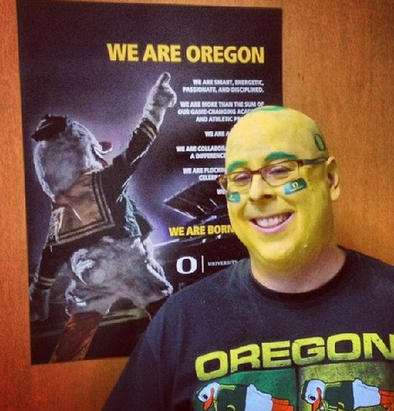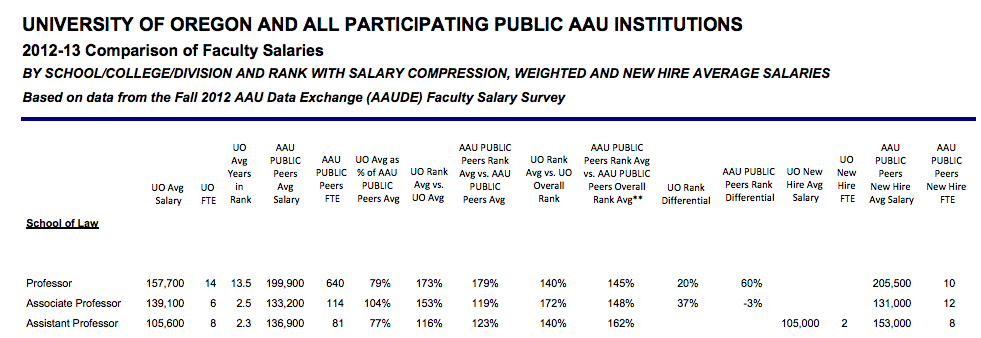I couldn’t listen to it all, but it seems Knight Law School Dean Michael Moffitt managed to avoid any mention of the $10M subsidy from CAS tuition money that he was given – by the office of his wife, VPFA Jamie Moffitt – to pay for scholarships for law students, to…
Posts tagged as “Rob Illig”
No surprise the google algorithm matched us. I hear Illig’s program is doing OK. In contrast Law Dean Michael Moffitt’s Alternative Dispute Resolution program must have been hit hard by the recent NYT series exposing endemic corporate abuses of arbitration. Moffitt’s previous NYT exposure – the “business school case study” – ended pretty disastrously.…
Update: Some brief notes from the meeting today: The PAGIA has not yet met this year. Gleason believes Kim Sheehan (Advertising) is still the chair. Gleason gives an interesting report on some of the topics that he and the PAC-12 and FBS conferences have and will be voting on (including many of…
3/20/2015 update:
From: “Thornton, Lisa” <pubrec@uoregon.edu>
Date: March 20, 2015 at 4:39:23 PM PDT
Subject: Public Records Request 2015-PRR-201
Dear Mr. Harbaugh:
The University of Oregon has received your revised public records request for “just the b) part” of your request made 02/26/2015, attached. The office has at least some documents responsive to your request. By this email, the office is providing you with an estimate to respond to your requests.
The office estimates the actual cost of responding to your request to be $151.78.
3/19/2015 update: Coltrane’s PR Office wants $732.92 to show what his secret athletics committee is doing
The University of Oregon, Office of Public Records has received your public records request for “any documents sent or received by the President’s Office relating to former President Gottfredson’s decision to establish the “President’s Advisory Group on Intercollegiate Athletics”, the determination of its membership, and its activities since”. The office is now providing an estimate to respond to your request.
The office estimates the actual cost of responding to your request to be $732.92. Upon receipt of a check made payable to the University of Oregon in that amount, the office will proceed to locate, copy, and provide the records you have requested that are not exempt from disclosure. Your check may be sent to the attention of Office of Public Records, 6207 University of Oregon, Eugene, OR 97403-6207.
Maybe the PAGIA Chair, Kim Sheehan (Advertising), or UO’s new FAR Tim Gleason (former Journalism Dean) will help make these public records public?
9/22/2014 update: Gottfredson’s last official act before skipping town with his $940K was to appoint former journalism dean Tim Gleason to replace longtime NCAA Faculty Athletics Representative Jim O’Fallon (Law), after presumptive heir Rob Illig (Law) crashed and burned with his viral “I’m worth $1M, so screw you unemployed law grads” campaign. The FAR’s are having their national meeting in November in New Orleans. For more info about what the FAR is supposed to do to balance the interests of big-time Duck sports and its multi-million dollar employees with our academic mission, try here. Meanwhile the UO Senate needs to decide what to do about Gleason – specifically this proposed legislation from Pedro Garcia-Caro calling for a Senate role in appointing a new FAR.

7/21/2014 update:
This winter Gottfredson set up a search committee to find a replacement for Jim O’Fallon (Law), who has had the FAR job for 25 years and who been the subject of repeated Senate motions and reports calling for a review and replacement. The Senate will take this up again in the fall. Andy Karduna (Human Phys) agreed to chair the committee, despite Gottfredson’s secrecy requirements. Karduna reported to the IAC and the Senate that the secrecy (and presumably Gottfredson’s control-freak job description and the requirement of a year-long apprenticeship to O’Fallon) kept several qualified and interested faculty from applying. Rumor has it that Rob Illig (Law) wanted the job, but his $1 Million salary goal was a bit too steep. The appointment was supposed to be made in June, but apparently there are still no takers.
6/20/2014 update: Gottfredson appoints IAC-lite, to evade faculty oversight of athletics
The day after President Gottfredson got the EPD report on the basketball rape allegations he decided to dismantle the Senate Intercollegiate Athletic Committee and appoint his own handpicked group of faculty to a new “Advisory Group”. Still no word on who Gottfredson will appoint as FAR in training. At least a few qualified and interested faculty refused to apply under the terms of Gottfredson’s secret search. The Senate will vote on legislation for a new search in the Fall, in any case.
Sure, Rob Illig has had some not so great press recently, but this new KEZI puff piece about his sports law camp makes him look pretty good. And while Dean Michael Moffitt got a mention in the NYT a few years ago, it appears he was less than completely honest about…
4/17/2014 update: And now the ABA Journal.
These emails have gone viral, with many hundreds of comments on law blogs like Lawyers Guns and Money, Tax Law Blog, Above The Law, Professor Bainbridge, JDU, Eschaton, Leiter’s Law School Reports, something called Gawker, and Jeff Manning’s piece in the Oregonian:
This was bad viral. The University of Oregon Law School professor’s wild rant about his compensation made Illig look petty and unsympathetic at the same time. More importantly, it shined a light on the raging debate about higher education, the value of advanced degrees and the mushrooming debt encumbering a generation of students.
The official UO law school blog – which, in an admirable demonstration of transparency actually allows comments, has responded:
To The Law School Community:
We’ve been getting some questions about a resolution brought to the last faculty meeting, and we’d like to share some information. Recently the University announced across-the-board cost of living adjustments and merit pay increases to take effect later in the year. A group of law faculty came up with the idea to divert the law school’s portion of the faculty merit pay funds to a post-graduate fellowship program for new law grads, in lieu of accepting a pay increase. Last Friday, this group brought this idea as a resolution (included below) to the regularly scheduled faculty meeting. A wide majority of those present voted to approve the resolution—in addition, a majority of the full faculty support the resolution.
We brought the matter to the Provost and although he is supportive of our goals he cannot bend the University rules to make this creative idea happen. However, we remain committed to finding ways to fund post-graduate opportunities and address other employment issues facing our graduates. We invite your comments and questions on this blog or one-on-one.
(I am not the Faculty Spokesperson. To avoid the appearance of speaking for everyone on the faculty, here I will include the names of some faculty who agreed to sign this statement (and I don’t mean to imply that those not included do not support it): Stuart Chinn, Michael Fakhri, Caroline Forell, Liz Frost, Erik Girvan, Carrie Leonetti, Mohsen Manesh, Roberta Mann, Michelle McKinley, Margie Paris, Jen Reynolds, Liz Tippett.)
Here is the text of the resolution from 4/11/2014:
The faculty recommends that the dean proceed with conversations with the Provost and the President regarding: reallocating funds for proposed faculty merit raises toward student fellowships, with a focus at present on post graduate student fellowships. If this proposal is approved, the faculty will revisit this reallocation of funds after two-three years.
4/14/2014: Several members of the law school email lists (which included staff, secretaries etc.) have forwarded these two emails from professor Rob Illig (Law) about a plan apparently floated by Law Dean Michael Moffitt (paid $292,800 after a recent raise) to deal with the law school’s enrollment problems and US News ranking, which has fallen from #80 to #100 since Moffitt took over in 2011.
The plan? Cancel raises for the faculty, and use the money to fund a program to give non-profits money to hire UO law school graduates, boosting the employment numbers that go into the US News rank.
Here are UO Law salaries for 2012-13, with comparison to other AAU publics:
Associate Professor Illig is not happy with Moffitt’s plan, or with the lack of transparency in how it was presented to the law faculty (who apparently voted to approve it).
Subject: Re: law-fac-staff: What happened to Oregon Law?
From: Rob Illig <rillig@uoregon.edu>
To: Rob Illig <rillig@uoregon.edu>
Cc: Dustin Littrell <littrell@uoregon.edu>, law-faculty Faculty <law-faculty@lists.uoregon.edu>, “law-fac-staff@lists.uoregon.edu Staff List” <law-fac-staff@lists.uoregon.edu>, Dan Miller <dmiller@uoregon.edu>
Michael,
To my shock and amazement, I just learned – three days after the faculty
meeting – that someone (you? the faculty?) is trying to take away my
one-in-a-decade chance at a raise WITHOUT MY KNOWLEDGE OR CONSENT.
Law School Dean Michael Moffitt’s previous efforts to find money to offset declining law enrollments have not gone as smoothly as say, a business school case study. The latest effort is a 5 week sports-law summer program. Tuition is $10,000 for 6 credits, and an extra $1,000 will get you a…
10/28/13: Intercollegiate Athletics Committee retreat: In the absence of formal minutes from the meeting, I’m posting a brief summary. The agenda for the retreat, held Tuesday 10/22, was set by IAC Chair Rob Illig (Law) as follows: 3:00 – 3:15 – IAC Chair Rob Illig leads introductions3:15 – 3:30 – Senate…
6/14/2013: President Gottfredson has to decide who will replace retired UO law professor Jim O’Fallon very soon. O’Fallon has been the FAR for 23 years – since back when he actually was faculty – without ever going through a performance review. This is a clear violation of OUS rules, and…

